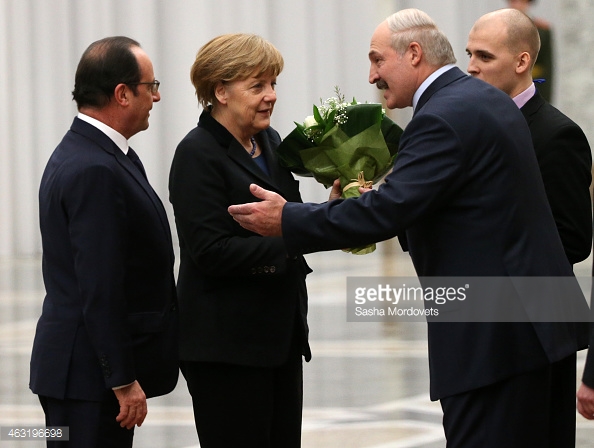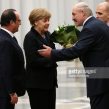
Bringing Belarus Back in From the Cold (Part Three)
Publication: Eurasia Daily Monitor Volume: 12 Issue: 111
By:

To read Part One, please click here.
To read Part Two, please click here.
President Alyaksandr Lukashenka’s policy is one of benevolent neutrality sympathetic toward Ukraine in the ongoing Russia-Ukraine war. Belarus’s diplomacy and its trade policies tilt in Ukraine’s favor to the extent possible without antagonizing Russia (see Part Two in EDM, June 11). Ukraine is grateful, Western diplomacy appreciative, and Russia not irritated with Lukashenka’s course. Belarus has earned the role of mutually acceptable host to international negotiations aimed at defusing the Russia-Ukraine conflict. This “Minsk process” has seen top leaders and diplomats from Russia and Western Europe congregating in Minsk.
In parallel, a “track-two” process named the Minsk Dialogues has most recently started. It aims to establish a platform of discussions with European, US and Russian participants, regarding Belarus’s role in the contemporary international system and national development choices.
Belarus does not have a state ideology. An ideologized Western diplomacy had frozen relations with this country for almost two decades. This policy’s failure is now tacitly recognized in the West, and some remedial tinkering has begun (see EDM, June 12). Meanwhile, Russia’s hot breath over Europe’s East helps to start melting the ice on the West’s relations with Belarus.
Belarus found it increasingly hard to maintain its de facto neutrality in recent years, under conditions of Western ostracism. “Isolation” was a misnomer for the West’s policy. It was actually pushing Belarus into heavier economic dependence on Russia, which in turn demanded closer military ties. Yet, notwithstanding the formal alliance with Russia, Belarus remains essentially neutral de facto, as long as it can hold to that choice. President Lukashenka has demonstrated this by adopting the stance of “positive neutrality” (“neutrality plus”) toward Ukraine during the Russia-Ukraine war.
De facto, the territory of Belarus shields Latvia and Lithuania from the south, Poland from the east, and Ukraine from the northwest, practically securing Ukraine’s rear from that direction. It is a shared interest of Belarus, its neighbors, and the neighbors’ Western allies, to uphold Belarus’s de facto neutrality against any further erosion. Russia will probably continue trying to advance that erosion by exploiting Minsk’s economic dependence.
The European Union is best placed to help Belarus preserve the right of strategic choice in that regard. The EU’s mix of soft-power instruments, including EU-funded modernization projects and investments, could have and may still offset Russia’s ability to arm-twist Belarus economically into strategic concessions. But Brussels and Washington abandoned the field to Moscow, compounding the abandonment through economic sanctions on Belarus and personal sanctions against numerous Belarusian officials (precisely the class that needs support to consolidate state sovereignty). The combined sanctions were supposed to advance human rights and democracy in Belarus and, from time to time, to undermine its government.
Ultimately, the lifting of sanctions came to depend on the release of all detainees who were sentenced in 2011 in the wake of post-election riots. From the original 20-plus detainees, 3 are still in prison at this moment, eligible (like most of those released) for presidential pardons, if they apply. The authorities can act in the national interest to break the deadlock by releasing them unilaterally, in a timely manner. Their release is an “absolute must” for lifting the EU sanctions and unblocking the overall relations, as the EU and US insist.
The European Commission, in office since November 2014, is not directly identified with the decade-old policy of sanctions, but neither is it free from that policy’s constraints. The new Commission is about to undertake a comprehensive policy review of the EU’s Eastern Partnership and EU relations with each partner country. At least a few EU think-tankers propose a more mature, more creative EU policy that would help consolidate Belarus’s sovereignty, state capacity, and economic resilience vis-à-vis Russia (Cer.org, April 10).
From Minsk’s perspective, Brussels’s policy review ought to identify common interests and pursue them separately from the EU’s “democracy promotion” agenda. The specter of Russia’s geopolitical revanchism casts its shadow over this debate, although this fact will seldom be acknowledged publicly by Minsk or even Brussels. The Belarusian government hopes for closer ties with the EU in order to lessen Belarus’s dependencies on Russia. The EU will undoubtedly be reassured to hear Minsk’s view that their possible rapprochement should proceed gradually and cautiously, so as to avoid the risks of Russian economic retaliation to Belarus or the appearance of a West-versus-Russia competition over Belarus.
Minsk hopes that the EU’s policy review would result in a road map for the normalization of EU-Belarus relations, bilaterally as well as in the framework of the EU’s Eastern Partnership. To work effectively, the sectoral programs would need to be based on joint inputs from the EU and Belarus. Thus the “joint ownership” principle, which defines the EU’s cooperation programs with most partner countries, would also operate with Belarus, replacing Brussels’s take-it-or-leave-it type of offers to Minsk.
Similarly, it seems long overdue for Brussels to apply its “more for more” principle (more EU rewards for better governance) in relation to Belarus. The EU has withheld those rewards by conditioning them narrowly on democracy criteria. It would only be rational, however, for Brussels to take the criteria of the Human Development Index and Social Progress Index into account. Belarus is the top performer on those criteria among the EU’s Eastern Partner countries (see Part One in EDM, June 9).




